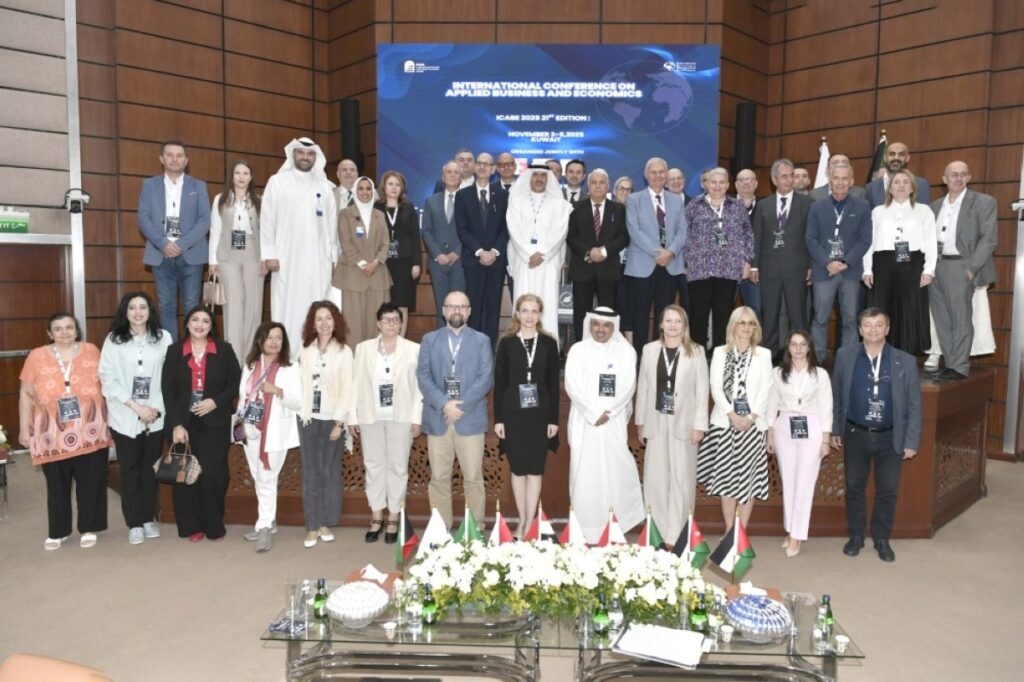21st ICABE 2025 in Kuwait promotes integration of technology, education and economy
KUWAIT: The Arab Open University (AOU), Kuwait, inaugurated the 21st International Conference on Applied Business and Economics (ICABE 2025) on Monday at Qutaiba Al-Ghanim Theater, Al-Ardiya, aiming to foster synergies that drive innovation and sustainable development. Held for the first time in the Middle East, the conference runs from November 3 to 5, 2025.
The opening ceremony was attended by Prof Salah Al-Hammadi, President of the AOU; Dr Afnan Al-Khaldi, Deputy Director of the University in Kuwait; Prof Salah Al-Sharhan, Chair of ICABE 2025; and Prof Eleftherios Thalassinos, President of the International Strategic Management Association (ISMA). Also present were ambassadors of several countries, more than 20 university presidents, and a distinguished gathering of experts, academics and professionals in economics and business from around the world.
“Hosting this prestigious global academic event reflects AOU’s leadership in advancing research and innovation in the region,” said Prof Al-Hammadi in his opening remarks. “This year’s theme — Synergizing Innovation: The Global Nexus of Business, Technology, Education and Economic Sustainability — aligns with the university’s mission to integrate innovation, technology and education to build a sustainable and resilient global economy.”


Prof Salah Al-Hammadi delivers his opening remarks.

Prof Eleftherios Thalassinos speaks at the inaugural session.
Welcoming the participants, Prof Al-Hammadi noted that ICABE serves as a global platform for scientific dialogue and exchange of expertise. The conference is organized in partnership with ISMA and in collaboration with the International University of Science and Technology in Kuwait, with broad international participation to discuss emerging trends in business, economics, and the role of innovation and digital transformation in driving global sustainability.
He underlined AOU’s commitment to building effective partnerships between academia, industry, and society, adding that the conference offers an ideal opportunity to strengthen international cooperation. He also thanked global organizations and universities for their confidence in the university’s growing regional and international role. Dr Afnan Al-Khaldi emphasized the importance of the conference in enhancing Kuwait’s position as a hub for knowledge and scientific research, noting that AOU continues to nurture an academic environment that inspires innovation and entrepreneurship aligned with national and regional development goals.
Collaboration
“The joy of collaboration defines ICABE’s spirit,” said Prof Thalassinos. “Over the next few days, we will explore the global economy — its past, present and future — examining how economic forces, geopolitical shifts and social transformations shape our world. These conversations go beyond academics; they address the realities that affect nations, businesses and communities alike. Through dialogue, true understanding grows.” He added: “By combining knowledge and creativity, we find solutions, spark innovation, and build a future of prosperity, sustainability and peace.”
Sustainable growth
“Over the past decade, technology has reshaped business models, disrupted industries, and changed the way we communicate,” said Conference Co-chair Prof Kamal Naser. “Artificial intelligence, fintech, green technologies and digitization platforms have transformed the global economy. Yet, innovation without a strong ethical and sustainable foundation can worsen inequality and harm the environment.” “This is why our conference focuses on innovation and economic sustainability — ensuring that innovation yields not just profit, but long-term social well-being and responsible environmental management,” he added.
Prof Naser stressed that universities and research institutions are not merely centers of knowledge but engines of change. “They prepare entrepreneurs, engineers and policymakers who will shape the future global economy. As educators, we have a duty to integrate ethics, creativity and sustainability into our teaching, ensuring graduates are not only skilled but also socially conscious.” Highlighting the collaborative essence of ICABE, Prof Naser said the conference brings together experts from business, academia, government, and the technology sector in cross-disciplinary discussions that transcend traditional professional boundaries. “Economic growth must align with values such as fairness and ethics to foster truly sustainable development,” he concluded.
Among the keynote speakers at the opening session were Prof Waldemar Tarczynski, Rector of the University of Szczecin, Poland; Prof Slawomir Bukowski, Rector of Casimir Pulaski Radom University, Poland; Dr Aleksander Ostenda, Rector of the Academy of Silesia Katowice, Poland; and Prof John Malindretos, Senate Representative at William Paterson University, USA. The three-day conference features a rich scientific program of specialized sessions and keynote lectures by top international experts, addressing key themes such as the digital economy, entrepreneurship, innovation management, quality education, and the achievement of sustainable development goals.

